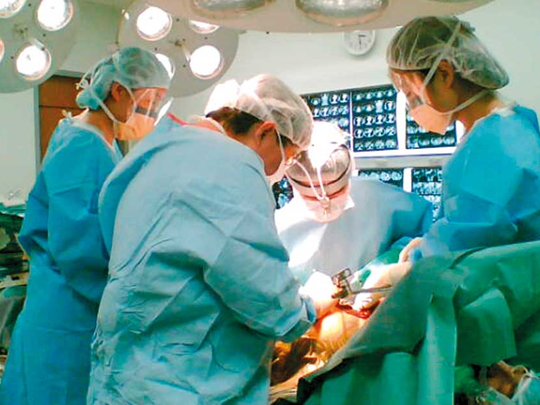
Abu Dhabi: There has been up to a 40 per cent increase in the prevalence of non-alcoholic fatty liver disease among Emiratis over the last decade, and without proper intervention, the condition can lead to liver cancer and failure, a top doctor has warned.
The condition is the fastest growing reason why Emiratis need to undergo liver transplants, the second most common organ transplant worldwide, Dr Lee Kang Hoe, senior consultant at the Asian American Liver Centre (AALC), told Gulf News. The AALC has been tasked with providing liver care for Emiratis over the last 10 years, and is a top facility for living donor liver transplants.
“Liver cancer is still the top reason why Emirati patients undergo living donor liver transplants at the facility, but non-alcoholic fatty liver disease itself increases the risk of developing liver cancer,” Dr Kang Hoe said.
“About 51 Emirati patients have so far undergone living donor liver transplants at our facility, and they make up the largest ethnic group among our patients,” he added.
While a handful of liver transplants have been carried out in the UAE, there is still no established centre to handle the procedure regularly. As a result, the majority of Emirati patients go for treatment abroad, including to the AALC in Singapore, and other facilities in India, Korea, China and Germany.
In general, liver transplantation can become necessary because of a number of reasons. For one, Hepatitis B and C infections can damage the liver, as can alcoholic liver disease. In other cases, liver tissue may be damaged as a result of non-alcoholic fatty liver disease, or the patient may suffer from liver cancer.
Dr Kang Hoe said 43 per cent of all Emirati patients who have undergone liver transplants at the AALC had liver cancer, while 32 per cent had liver damage from Hepatitis B or C.
“Still, we cannot underestimate the risk posed by non-alcoholic liver disease, especially with five per cent of the global population suffering from it now, especially in developed countries,” he said.
In the UAE, the risk of liver failure is greater because liver damage is closely linked to diabetes, hypertension and obesity, which are all highly prevalent among the population. In fact, about one in five adults is known to suffer from diabetes and nearly one-third of residents are overweight or obese.
“The risk of liver damage is growing rapidly across the world, and about five per cent of all people have fatty liver disease. Males are also more prone to liver failure, especially middle-aged men,” Dr Kang Hoe warned.
And although it is a common piece of advice, maintaining a healthy lifestyle is still the key to protecting the liver.
“You’ve got to eat healthy, avoid too much of a fatty diet, and get enough physical activity. A sedentary lifestyle increases the risk of liver damage,” Dr Kang Hoe said.













